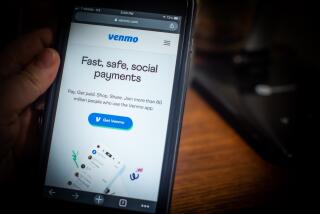Charging firms for cash deposits? To banks it makes sense
- Share via
Bank of America was forced by public outrage to retreat from a plan to charge people $5 a month to use their debit card.
But what if your bank told you that you’d have to pay it a fee to make a cash deposit? In other words, you’d have to give them money just to give them money. You’d be royally cheesed, right?
Yet major banks routinely ding their business customers with cash-deposit fees.
BofA, for example, says some of its business accounts levy a fee of 20 cents for every $100 in cash deposited after an initial $10,000.
Citibank charges 10 cents for every $100 in cash deposited after an initial amount ranging from $5,000 to $20,000, depending on the type of business account. Chase bank charges 40 cents for every $1,000 in cash deposited beyond an initial $7,500.
For smaller firms, many of which are barely scraping by amid the economic downturn, such fees can be a cold slap in the face at a time when every cent counts.
This is especially the case for restaurants and other businesses with razor-thin profit margins that handle numerous cash transactions.
“Many businesses are hanging on by their toenails right now,” said Betty Jo Toccoli, president of the California Small Business Assn., which represents more than 200,000 firms. “Fees like this can be the difference between staying in business and not staying in business.”
John Watson, 55, is a San Fernando Valley carpenter. He’s had a business account with Wells Fargo for years, using it for depositing payments from clients and writing checks to subcontractors.
He took a look the other day at the latest rules for his account, which took effect Oct. 15. Among other things, Watson faces a $12 monthly “service fee” just for being a Wells customer, as well as a charge of 20 cents for every $100 in cash deposited beyond an initial $5,000.
He doesn’t do that much business in cash. But as Watson told me, you never know.
“I couldn’t believe it when I saw it,” he said. “It’s like they’re trying to squeeze as much money out of you as they can.”
Such charges have been around for a while, but they’ve largely stayed below most people’s radar. For example, Toccoli said an informal survey of some of her members revealed that none were aware of extra fees for cash deposits.
Cash-deposit fees only seem to draw attention when they involve huge wads of money. Bank of New York Mellon raised eyebrows in August when it said it would charge its deepest-pocketed institutional clients an extra fee for deposits of more than $50 million. The bank said it wanted to deter investors from using it as a haven for excess cash.
At those multimillion-dollar levels, that’s understandable. Banks are swimming in money, and they have to pay fees to the Federal Deposit Insurance Corp. to cover their deposits.
But for small businesses — a coffee shop, say — this isn’t really an issue. In such cases, you’re talking about deposits of thousands of dollars in a good month, never millions.
Even so, banks say receiving even small business’ cash can be pricey.
Jennifer Langan, a Wells Fargo spokeswoman, said the extra fees are warranted by “the cost and risk of handling and safeguarding cash.” Colleen Haggerty, a BofA spokeswoman, said the fees cover “the time-intensive process of counting, verifying and bundling cash for tellers.”
Gary Kishner, a Chase spokesman, said the bank doesn’t keep customers’ extra cash on hand. “We ship it out,” he said. “So we have to arrange transit for the cash, and there are management costs attached.”
Call me old-fashioned, but handling customers’ cash is a service that banks have provided without complaint for centuries. They’re banks, for goodness sakes.
If a customer deposits a pile of cash, you stick it in the vault with the rest of the money. When the armored truck makes its regular visit, you hand it over and send it to, well, wherever banks send their money.
The “management costs” of such activities are belied by the modest fees involved. Chase needs to charge an extra 40 cents for every $1,000 deposited beyond a certain level? How could that possibly make a difference?
What’s more likely is that, as with so many other bank fees, these institutions are relying on the charges being so small that most customers won’t gripe. But multiplied over thousands or even millions of customers, such fees can add up to some serious money.
Banks don’t say how much they make from cash-deposit fees. However, non-interest income, which includes fees, now accounts for about a third of total bank earnings, according to consulting firm Market Rates Insight.
“They would have us believe that federal bank regulations are putting extra costs on them,” said Toccoli at the California Small Business Assn. “It looks more like they’re just trying to increase their income, even if it puts some customers out of business.”
There are a lot of bank fees that seem beyond the pale. A fee for giving a bank money is just plain absurd.
David Lazarus’ column runs Tuesdays and Fridays. He also can be seen daily on KTLA-TV Channel 5. Send your tips or feedback to david.lazarus@latimes.com.
More to Read
Inside the business of entertainment
The Wide Shot brings you news, analysis and insights on everything from streaming wars to production — and what it all means for the future.
You may occasionally receive promotional content from the Los Angeles Times.











